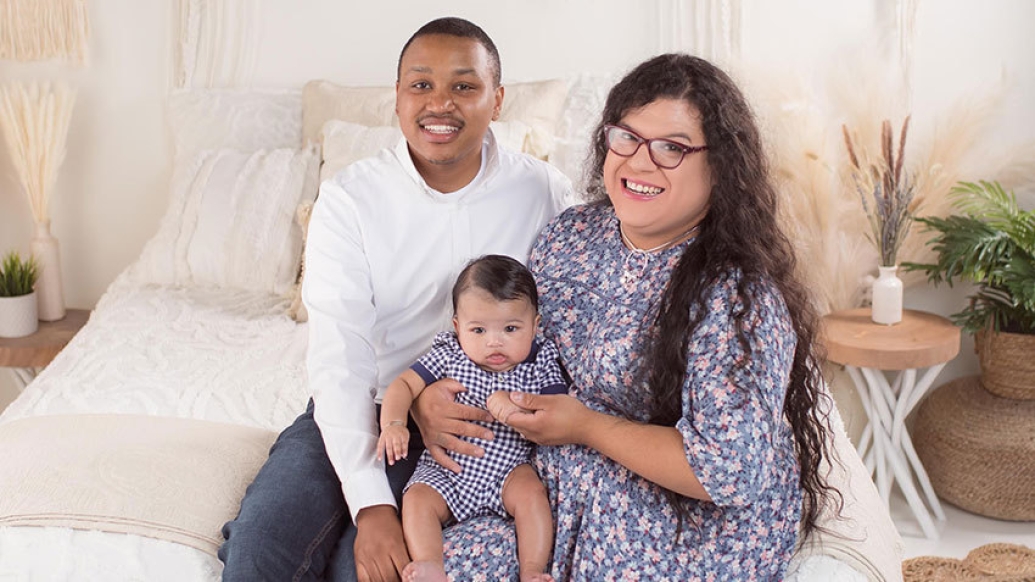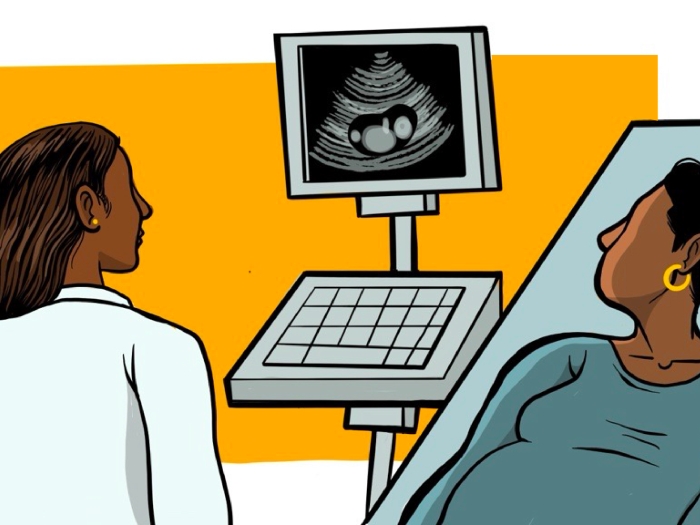Jesse and Maria Ballard wanted to have a baby naturally. So they did.
9:50 AM
Author |

When Jesse Ballard found out he was pregnant, he was shocked yet excited.
He and his wife, Maria, had been trying to conceive, but they weren't sure how quickly it would happen: Both Jesse and Maria are transgender, and the gender-affirming hormone therapies they had previously been on can interfere with fertility.
Before the couple met Daphna Stroumsa, M.D., an obstetrician-gynecologist at Michigan Medicine who specializes in the health care of transgender and non-binary people as well as that of others in the LGBTQ+ community, Jesse and Maria weren't sure it would even be feasible for them to conceive without medical assistance.
But on Maria's birthday, in July 2020, their dream of a big family began.
Over the next nine months, Jesse would navigate pregnancy and childbirth with the support of his spouse, family and an extensive team of health care providers. He would have an experience that's often seen as conditional — only available to certain people — but one he knew he should be able to have, regardless of his gender identity.
"I didn't want other people's opinion to deter me from having life experiences that everyone deserves," Jesse said. "My experience was that this was a beautiful thing, and the outcome was extraordinary — my son."
Getting to be himself
Jesse is used to being told that he can't get what he needs.
He knew he was male at a young age but encountered resistance from health care providers when he asked for hormones and surgery that would affirm his gender.
"As a teenager, I was like, 'I am telling you: This is who I am,'" Jesse said. "I was getting frustrated because it seemed like there was some kind of key code answer I needed, and I didn't know what that answer was."
That is, until he connected with Stroumsa, whom he was referred to through Michigan Medicine's Comprehensive Gender Services Program. One of the oldest gender-affirming care programs at an academic medical center in the country, the Comprehensive Gender Services Program helps connect transgender and nonbinary people to a variety of services ranging from primary care and hormones to gender-affirming surgery and fertility preservation.
At the time, Stroumsa, who identifies as queer, was a new faculty member at the University of Michigan Medical School. Yet their expertise on LGBTQIA+ topics already elevated them beyond the providers with whom Jesse was used to interacting.
"I think their background was just a safe place and I felt like they genuinely understood me and my body and my health care," Jesse said. "Before I met Daphna, I would constantly be educating my doctors on my own experience. Daphna was the first person to be able to have a point of reference and be able to help me without me having to educate my doctor. And because they had prior knowledge, they were able to help me greatly and generally give me a better life, a healthier life."
"It's not that because I'm queer I'm a better doctor to him," Stroumsa said, "but just that that gives me at least some insight or some tools into helping make sure that the care he gets feels right and to work to improve the care that we give in general."
Once Jesse met Maria (they bonded over their passions for eclectic music), he introduced her to Stroumsa. Both would go on to receive hormone therapy through Stroumsa for years, developing trust well before they married and started talking to the obstetric gynecologist about having a child.
"That was, I hope, particularly helpful for Jesse and Maria in their care," Stroumsa said. "The transition to moving into obstetric care when they decided they wanted to conceive was very smooth."
SEE ALSO: Couple Fulfills Dream to Become Dads Through Surrogacy
Jesse and Maria each came from large families and always wanted children of their own.
"You know how they ask you as a little kid what you want to be doing when you're 25?" Maria said. "I can remember thinking that I wanted to have a husband, a baby, a dog and a cat. I wanted to be able to do all the stuff that parents get to do — give their kids birthday parties and meet their friends and when they get older, see them start their own families."
Jesse's family, especially his mother, had modeled a culture of love and support that he wanted to pass down to the next generation. He had thought he might serve as a foster parent, like his mother and grandmother before him. But once he discovered that he could become pregnant if the couple temporarily went off their hormone therapy, he was ready to try.
For him, it's about having the same milestone experiences as many other parents — because there were countless times in his life when he was told he couldn't have the same things as the people around him.
He remembers crying in third grade, for instance. He'd told some classmates that he wanted to attend the University of Michigan like his mother, who was completing her doctoral research there. But they'd informed him that, because he was African-American, that wasn't a possibility.
"I came home from school saying, ''They said I can't go,'" Jesse recalled. "My mom was like, 'You can do anything you set your mind to.' From then on, I was like, 'I'm going to set my mind to it, and I'm going to do exactly what I need to do to do it.'"
Not only did he receive a degree in education from U-M (plus an associate's degree from Washtenaw Community College and a master's in education from the University of Southern California), he's taught summer courses at the university through a program for middle and high school students called Summer Discovery.
And he's received multiple letters from queer students in the program, including one from Puerto Rico who didn't feel accepted in his home island, thanking Jesse for showing up as himself.
The student feels more confident about his future, he said, because he's seen who he can become.
Planning for the baby
When a pregnancy test came back positive for Jesse, he and Maria started talking with Stroumsa about what they wanted his care to look like during pregnancy and labor and delivery.
"We engaged the entire care team — including, importantly, the nursing team — to make sure that they were on board and weren't taken by surprise and knew what to expect," Stroumsa said. "Jesse's not our first transmasculine person giving birth, but it's still not our routine and we wanted to make sure his and Maria's experience was positive and affirming."
Stroumsa brought in Gail Blakely, RNC-MNN, MSN/Ed., a clinical coordinator for the Von Voigtlander Women's Hospital, to make sure Jesse and Maria's needs were communicated to everyone who would be interacting with them.
"My first question is always what does good-quality, compassionate, respectful care look like to you," Blakely said. "And then I usually ask about the concerns that you have. And then we discuss those concerns, and I try to offer reassurance and look at whether there's something the nursing team and I can do so that concern doesn't happen or to minimize the potential of it happening."
For Jesse and Maria, the priorities were ensuring their baby was healthy and that Jesse's pain was controlled during labor followed closely by treatment and language that respected them, like referring to Jesse as the father and Maria as the mother.
"Our nurses are used to calling our patients 'Mom,'" said Charisse Loder, M.D.,clinical assistant professor of obstetrics and gynecology at Michigan Medicine. "That's definitely something where we were careful with communicating what terminology he wanted to use and what terminology Maria wanted to use and making sure that was consistent."
Blakely approached several nurses whom she thought would be interested in being part of the primary team to care for Jesse, so he didn't have to repeat his and Maria's story and preferences over and over again to new caregivers. Many nurses and techs said they'd be honored to take care of this family.
Once she had her interdisciplinary team set, Blakely acquainted them with Jesse and Maria's story and their birth plan and gave opportunities to ask questions or identify concerns ahead of time. She asked to have brochures printed that used gender-neutral language. Another clinical care coordinator, Melissa Cantrell, R.N., gave Jesse a tour of the department so he could see an example of the room where he'd give birth and one where he'd stay postpartum.
"I thought that was helpful and extremely kind," Jesse said. "They did a lot for me, and I appreciated it."
Meeting new doctors
But, as Stroumsa, Blakely and the rest of the care team had warned Jesse, things in the labor and delivery unit don't always go according to plan.
Around the beginning of Jesse's third trimester, Stroumsa needed to take medical leave, and Loder had to step in to handle his remaining prenatal as well as postpartum care.
"I imagine it was hard to pivot and say, 'Now I'm going to put trust in a new provider I don't know anything about,'" Loder said. "I think it's stressful meeting new people for anyone who's pregnant because it can be hard to put trust in a new person when you're having such a key moment in your life."
"When I was told about Dr. Loder, I was hesitant," Jesse admitted, "but she was very kind, very thoughtful, and she educated herself and went above and beyond as well." (Loder knew she'd established a good rapport with Jesse when he called her "cool.")
By this time, Jesse could barely walk. Acid reflux was kicking in. Although he'd reveled in the human growing inside him with Maria and the rest of his family, he was ready not to be pregnant anymore — and to meet his child.
But, after 48 hours of labor, the baby was not budging.
Jesse was exhausted. His cervix hadn't dilated very much. To make matters worse, the epidural wasn't working; one provider mixed up his pronouns; and physicians were switching shifts, so there was yet another new person in the room who would have to complete the cesarean section the team decided was the best option.
Yet that obstetrician-gynecologist ended up giving Jesse exactly what he needed.
Jesse remembers seeing a pair of blue eyes pop up under the operating table.
"His little blue eyes looked up at me, and he said, 'We're about to get this baby out and you're going to wake up and it's going to be over, and you're going to go home, and it's going to be perfect,'" Jesse recalled. "I was like, 'You're perfect, Mr. Blue Eyes.'"
Mr. Blue Eyes generally goes by Adam Baruch, M.D., assistant professor of obstetrics and gynecology at Michigan Medicine.
"During Jesse's birth, I focused on his process of becoming a parent just like I would with any new parent," Baruch said. "This was a huge moment in their lives, and I saw my role as supporting Jesse and his family and making sure that Jesse and his baby were as safe as possible."
Jesse was put to sleep during the procedure. When he woke up, he was still talking about the man with blue eyes.
But his focus quickly switched to the baby: 8 pounds, 2.5 ounces, all tiny fingers and toes intact. Maria brought him over to Jesse and laid him on Jesse's chest.
The newborn looked up at Jesse and smiled.

Be yourself, baby
Jesse Yvonne Ballard Jr. is perfect.
Now four months old, the baby has dark hair and dimples like his mother, Maria. He's got the mild-mannered temperament of his father, Jesse; he doesn't cry unless he's "really trying to let you know how he feels," Jesse said. When his parents read to him or take him to a park or dance with him to Selena's poppy Tejano hits, he looks around and slowly takes everything in, absorbing this new world with sparkly-eyed wonder.
"There's no experience I don't want him to have," Jesse said. "That's something I'd like to teach him as he grows up, that I have unconditional love for him — and he should have unconditional love for everyone else, no matter what."
SEE ALSO: Lifting Barriers to Care for Transgender and Non-Binary Patients
Jesse and Maria call the baby "Junior." They're using he/him pronouns for Junior at the moment but are prepared to shift if he identifies with a different gender when he's older.
"Anything he wants to be or do, I'll be OK with," Jesse said. "I want him to be able to walk life as himself, and I want to just let him be him."
"Being the special type of couple that we are, being able to find each other, being able to live the life that Jesse's mom has always instilled in him — that you can do anything that you put your mind to — it's my fairy tale," Maria said. "You can have the family that you want, the house that you want, the life that you want. And that's something we want to continue to instill in Junior. We were able to overcome a lot of things and do what we wanted to do. And he can do anything, too."
The couple have positive memories from their pregnancy experience at Michigan Medicine, even though it wasn't perfect.
"I went in there knowing that not everyone is going to understand the situation, but it's a learning experience," Jesse said. "It was another transition in my life where I had this experience that some might say is conditional. But they gave me unconditional love — and unconditional health care."

Explore a variety of healthcare news & stories by visiting the Health Lab home page for more articles.

Department of Communication at Michigan Medicine
Want top health & research news weekly? Sign up for Health Lab’s newsletters today!





